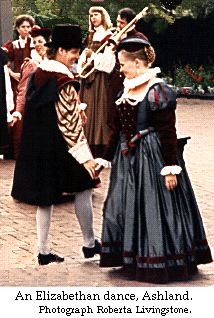Early masques
The masque was a popular entertainment in the Elizabethan and Stuart courts. Masques began as costume balls designed around a theme; costumed guests would perform a dance before the host and company, after which they would invite the spectators to join them*.*
Typically, masques were occasions for revelling during festive events such as weddings, or Christmas. The masque usually began after supper, continuing into the night and sometimes into early morning. After the performance, the revelling continued with a banquet, and guests were often known to become quite unruly--in 1605 one banquet "was so furiously assaulted that down went tables and tressles before one bit was touched."
Both Henry VIII and Queen Elizabeth were fond of dancing and the masque: Henry actually wrote music celebrating good times at court*.
Footnotes
-
Gatecrashers at the masque
Romeo gatecrashes the Capulets' party in a group of masquers, and meets Juliet as they dance afterwards (1.5) -- an example of the early masque (there are others, with suitably mistaken identity in Love's Labour's Lost and Much Ado About Nothing).
In The Tempest, Prospero uses his magic to stage-manage a more elaborate masque of the kind discussed in the following screens.
-
A pastime
This music was written by Henry VIII: it is a setting of a poem he wrote, "Pastime with Good Company."
